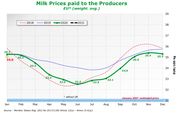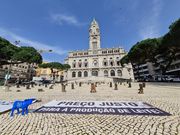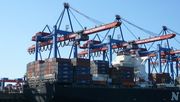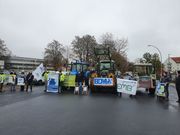EMB Newsletter March 2021
Newsletter as PDF
Contact
EMB - European Milk Board asbl
Rue de la Loi 155
B-1040 Bruxelles
Phone: +32 - 2808 - 1935
Fax: +32 - 2808 - 8265
Dear dairy farmers, dear interested parties,
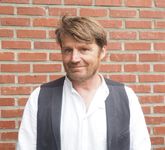
As the end of the winter draws near, we are in a position that we have long hoped for: our proposals for a better and more stable dairy market have entered the political debate. In what are known as trilogues, the European Parliament is currently negotiating the reform of the Common Market Organisation (CMO) with the European Council. As an integral part of the EU Common Agricultural Policy, the CMO sets out market framework conditions and a range of different crisis instruments. However, as the Council seems to be hesitant, it is important to maintain pressure and to support the good proposals, like temporary volume reduction, put forth by the Parliament.
Our arguments underlining the imperative need for effective crisis instruments must also touch on avoiding further equity losses on farms and improving our market position. We have already received positive signals on these points from German food retailers as well as policy-makers. In addition, the CMO proposals provide useful leverage with respect to the necessary sustainability transition on the road to greater climate and environmental protection. Last but not the least, the Green Deal and its strategies can only succeed if farms earn a fair income, receive compensation for additional efforts and are backed by an effective policy framework.
So, let’s remain active, keep a close eye on the discussions and negotiations, and continue to take stock of the current state of play. This is how we lay the groundwork for better times!
In this edition, you will find the usual information on the most important market indicators. On the occasion of International Women’s Day, our colleagues from Uniterre take a look at the situation of women farmers and the state of gender equality on farms. Aprolep reports on a strong action to ensure a sustainable future for milk production. Our Irish Executive Committee member Pat McCormack talks about a surprising assessment by the European Commission on free trade agreements. The BDM provides an update about its work with the partner organisations in the Milk Dialogue, which is now moving forward with demands regarding the CMO and speaking with retailers and processors. And finally, we are happy about some news from a member country, where spring is probably still a bit further on the horizon: Lietuvos pieno gamintojų asociacija reports from Lithuania. And for all of you who would like to dig deeper into agricultural topics, we present the critical agriculture report 2021 with its theme “World feels the heat – climate and change”.
I hope you will enjoy reading this newsletter!
Elmar Hannen, EMB Executive Committee member and board member of the BDM
Report says EU trade agreements benefit EU farmers – “illogical and pointless”, say ICMSA
The Milk Dialogue demands: improve market position of farmers
News from Lithuania
Critical Agricultural Report 2021 is now out
Impressum
European Milk Board asbl
Rue de la Loi 155
B-1040 Bruxelles
Phone: +32 2808 1935
Fax: +32 2808 8265
E-Mail: office@europeanmilkboard.org
Website: http://www.europeanmilkboard.org

